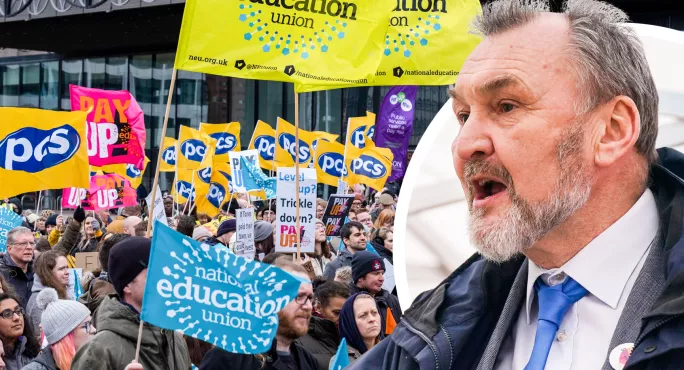NEU attacks ‘new and unusual’ DfE stance on pay talks

The NEU teaching union has criticised the education secretary’s “new and unusual” approach to pay talks in a blistering letter sent today.
The criticism was in response to Gillian Keegan’s letter to education unions this morning, calling on the NEU to enter formal talks on teachers’ pay, rather than taking strike action.
Hundreds of thousands of members of the NEU are expected to take part in two consecutive days of strike action across England from tomorrow (Wednesday 15 March) in a long-running dispute over pay.
- NEU: “Distraction politics” won’t avert strikes
- Teacher pay dispute: NEU left out of latest DfE union meetings
- Heads: Stop “trading in fatuous soundbites”, Keegan told
Ms Keegan first invited the NEU to formal talks on teachers’ pay three weeks ago, on the precondition that the union’s planned strikes were cancelled.
In a second letter today, an open letter to parents, Ms Keegan says: “The single best thing the NEU could do for both its members and for children and young people would be to sit down and talk about pay.
“I will continue doing everything I can to end the disruption your family is facing as quickly as possible, particularly because I know exams for older pupils are coming up fast.”
Teacher strikes: ‘precondition’ for pay talks
However, the NEU’s joint general secretaries, Dr Mary Bousted and Kevin Courtney, sent a strongly worded letter in reponse to the two letters, criticising Ms Keegan’s “precondition” for talks.
Their letter states: ”The Department for Education’s attitude towards talks is not only unusual but counterproductive.
“The precondition itself is very new and unusual.”
They add that the DfE has ”set a whole new precedent, which is nothing more than a stumbling block with which to play politics”.
The letter also tells Ms Keegan that the ”responsibility” for strikes “lies squarely with your department”, and says the action had been “wholly avoidable, were it not for your insistence on a spurious precondition which cannot and should not be met”.
Referring to the teacher pay disputes elsewhere in the UK, the general secretaries say that teachers in Scotland had been able to consider an offer, while in Wales “a serious offer” had led to the “pausing of NEU strike action on two occasions in the past month”.
They add: “No preconditions were thought necessary by the Scottish and Welsh governments, and the sky did not fall in. Progress has been made. England, meanwhile, lags behind other countries yet again.”
Geoff Barton, general secretary of the Association of School and College Leaders, also criticised the DfE today after emerging from talks with Ms Keegan, calling the lack of action taken to avert a strike “extremely regrettable”.
He said: “Her reason for ending talks was her view that the NEU should first pause strike action - despite there being no hint of an actual offer. This precondition created an impasse, and she subsequently rejected our joint call to bring in Acas [the Advisory, Conciliation and Arbitration Service] to conciliate.
“Parents should know that this week’s strikes could have been averted if proper negotiations had taken place to secure a settlement.
“This is extremely regrettable, but we will nevertheless continue to engage constructively and hope for a resolution in the near future.”
Yesterday it was revealed that the education secretary plans to meet with leaders of three of the main education unions this week, but not the NEU.
Paul Whiteman, general secretary of school leaders’ union the NAHT, reiterated his demand that formal negotiations only take place when every union is present, following his meeting with Ms Keegan yesterday.
He told the PA news agency: “Unfortunately, she hasn’t been able to find a way through to get us all together and it is certainly my preference that we should meet together, not separately.”
Public support for strikes remains high
Meanwhile, in a YouGov survey of 2,004 adults across the UK last week, half of respondents (50 per cent) supported strike action by teachers over pay and working conditions - a fall of one percentage point compared with the last time the survey was carried out at the end of January.
And almost half of respondents (48 per cent) thought teachers were underpaid, while 28 per cent thought they were paid the right amount, 10 per cent thought they were overpaid and 13 per cent did not know.
Some 40 per cent of respondents thought the government was to blame for teacher strikes, while just under a quarter (24 per cent) thought trade unions were at fault, and 18 per cent thought both parties were equally to blame.
You need a Tes subscription to read this article
Subscribe now to read this article and get other subscriber-only content:
- Unlimited access to all Tes magazine content
- Exclusive subscriber-only stories
- Award-winning email newsletters
Already a subscriber? Log in
You need a subscription to read this article
Subscribe now to read this article and get other subscriber-only content, including:
- Unlimited access to all Tes magazine content
- Exclusive subscriber-only stories
- Award-winning email newsletters
topics in this article



